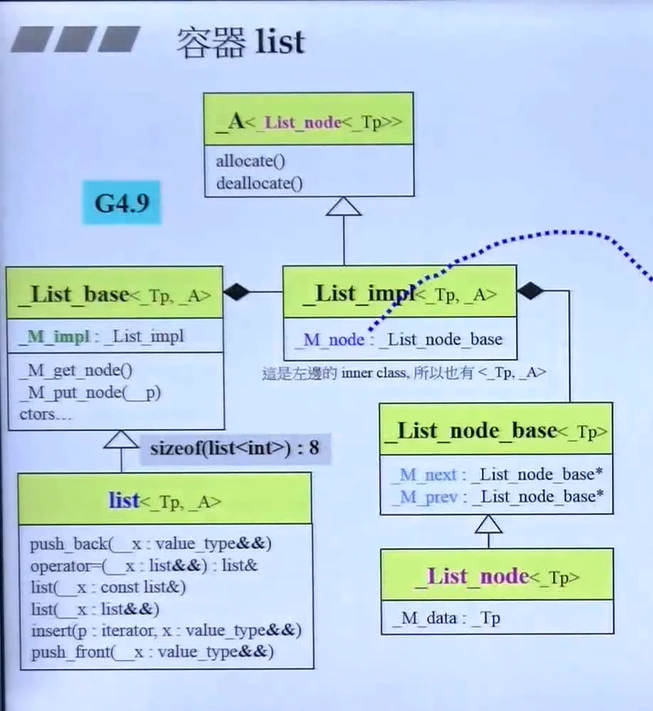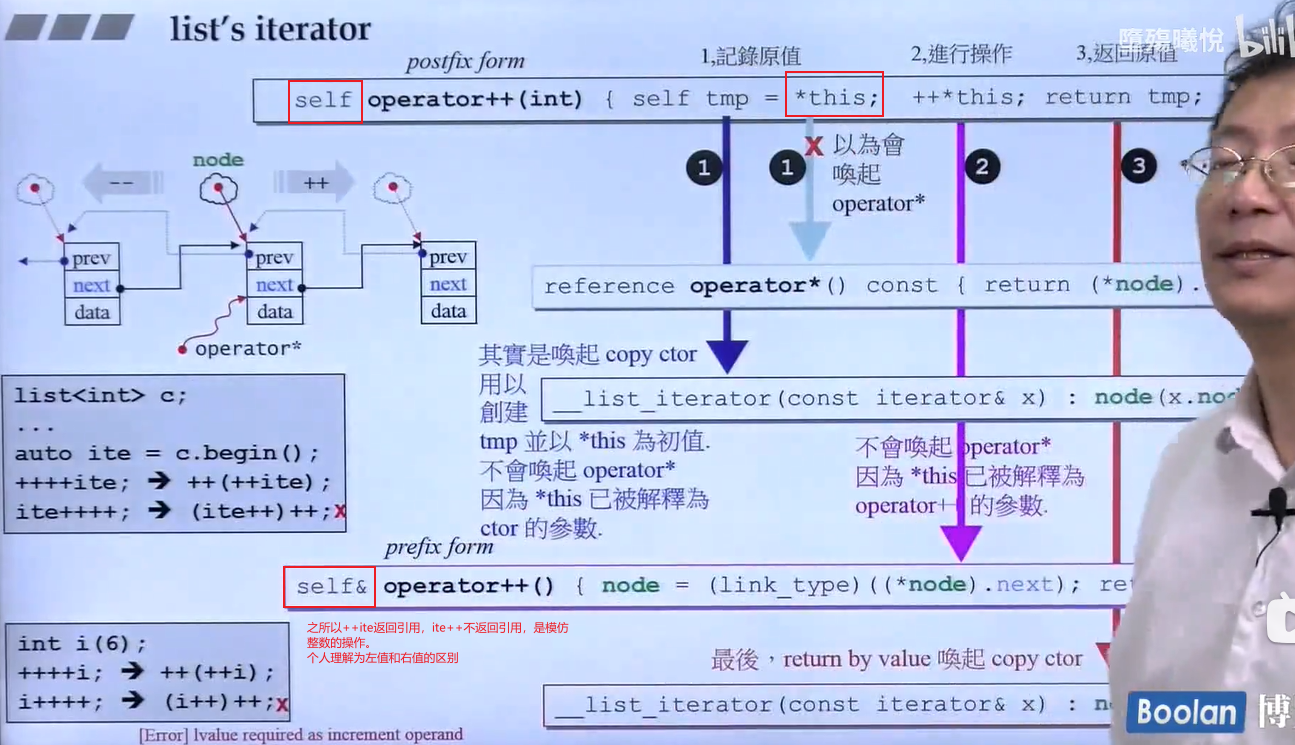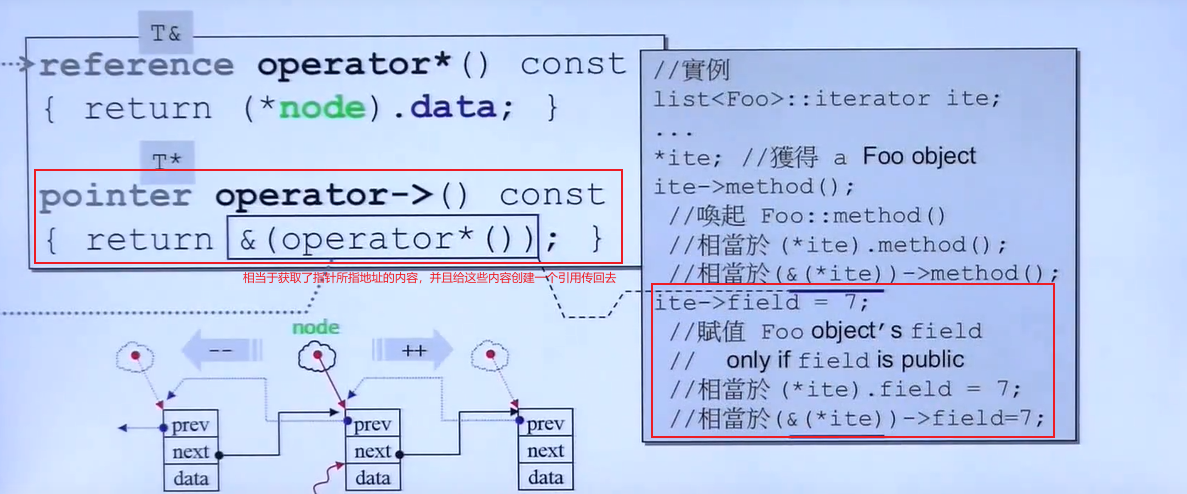# 一、知識點 ## 1. std::bidirectional_iterator_tag `std::bidirectional_iterator_tag` 是 C++ 標準庫中定義的一個迭代器類型標簽,用於標識支持雙向遍歷的迭代器類型。 在 C++ 中,迭代器是一種泛型指針,用於遍歷容器中的元素 ...
一、知識點
1. std::bidirectional_iterator_tag
std::bidirectional_iterator_tag 是 C++ 標準庫中定義的一個迭代器類型標簽,用於標識支持雙向遍歷的迭代器類型。
在 C++ 中,迭代器是一種泛型指針,用於遍歷容器中的元素。迭代器類型標簽用於標識迭代器的特性,從而在演算法中選擇合適的迭代器類型。
std::bidirectional_iterator_tag 是迭代器類型標簽中的一種,用於標識支持雙向遍歷的迭代器類型。雙向迭代器可以向前和向後遍歷容器中的元素,支持 ++ 和 -- 運算符。
標準庫中的許多演算法都要求迭代器支持特定的操作,例如 std::reverse 要求迭代器支持雙向遍歷,因此可以使用 std::bidirectional_iterator_tag 標簽來限定迭代器的類型,從而保證演算法的正確性。
//迭代器類型標簽,用於標識支持雙向遍歷的迭代器類型,支持++和--運算符
typedef std::bidirectional_iterator_tag iterator_category;
2. ptrdiff_t
ptrdiff_t 是 C++ 標準庫中定義的一個整型類型,用於表示指針之間的差值(即兩個指針在記憶體中的地址差距)。在 C++ 中,指針的加減運算結果是一個 ptrdiff_t 類型的值。
ptrdiff_t 的實現是平臺相關的,通常是一個帶符號的整數類型。在 32 位平臺上,ptrdiff_t 通常是一個 4 位元組的整型,而在 64 位平臺上,ptrdiff_t 通常是一個 8 位元組的整型。
使用 ptrdiff_t 類型可以保證指針操作的安全性,因為指針之間的差值可能超出普通整型的表示範圍。此外,使用 ptrdiff_t 類型還可以提高代碼的可移植性,因為不同平臺上指針的大小可能不同。
//帶符號整型,表示指針之間的差值(即兩個指針在記憶體中的地址差距)
typedef ptrdiff_t difference_type;
3. #if __cplusplus >= 201103L
#if __cplusplus >= 201103L這行代碼是C++中的條件編譯指令,意思是如果當前編譯器支持C++11標準或更高版本,則編譯下麵的代碼。其中,__cplusplus是一個C++預定義巨集,表示當前編譯器所支持的C++標準版本,201103L表示C++11標準的版本號。因此,這行代碼的作用是在編譯時檢查當前編譯器是否支持C++11標準或更高版本,如果支持,則編譯下麵的代碼,否則忽略。
4. explicit
explicit 是 C++ 中的一個關鍵字,用於修飾類的構造函數,表示該構造函數是顯式的,不能進行隱式轉換。
在 C++ 中,如果一個類的構造函數只有一個參數,那麼這個構造函數可以被用於隱式轉換。例如,如果有一個類 A 和一個構造函數 A(int),那麼可以使用 A a = 1; 的方式創建一個 A 類型的對象,這裡的 1 會被自動轉換為 A 類型。
使用 explicit 關鍵字可以禁止這種隱式轉換,從而避免一些潛在的問題。例如,如果一個類 B 有一個構造函數 B(int),但是我們希望這個構造函數只能顯式調用,那麼可以將其聲明為 explicit,這樣就不能再使用 B b = 1; 的方式創建一個 B 類型的對象,而必須顯式地調用 B b(1);。
另外,explicit 關鍵字還可以用於修飾轉換函數,表示該函數也是顯式的,不能進行隱式轉換。
5. stl_list.h結構

6. 迭代器相關
- 運算符重載
重載++(分為++item與item++)

重載*、&

7. 迭代器 traits
-
模板偏特化(感覺類似java泛型重載)

-
完整的iterator_traits

二、源碼
_List_node_base
主要提供了prev和next指針,以及一些方法。
struct _List_node_base
{
_List_node_base* _M_next;
_List_node_base* _M_prev;
...
};
_List_node
繼承自_List_node_base,主要提供了一個存放數據的 _M_data
/// An actual node in the %list.
template<typename _Tp>
struct _List_node : public __detail::_List_node_base
{
///< User's data.
_Tp _M_data;
//檢查編譯器是否支持c++11及以上版本
#if __cplusplus >= 201103L
template<typename... _Args>
_List_node(_Args&&... __args) //萬能引用
: __detail::_List_node_base(), _M_data(std::forward<_Args>(__args)...) //完美轉發
{ }
#endif
};
_List_iterator
迭代器
1. 必須定義的五個typedef
//下麵這五個typedef是每個iterator必須有的
//帶符號整型,表示指針之間的差值(即兩個指針在記憶體中的地址差距)
typedef ptrdiff_t difference_type;
//迭代器類型標簽,用於標識支持雙向遍歷的迭代器類型,支持++和--運算符
typedef std::bidirectional_iterator_tag iterator_category;
typedef _Tp value_type;
typedef _Tp* pointer;
typedef _Tp& reference;
2. 兩個構造器
_List_iterator() _GLIBCXX_NOEXCEPT
: _M_node() { }
explicit //修飾類的構造函數,表示該構造函數是顯式的,不能進行隱式轉換
_List_iterator(__detail::_List_node_base* __x) _GLIBCXX_NOEXCEPT
: _M_node(__x) { } //_M_node:_List_node_base
3. 運算符重載
個人理解,此處之所以能夠向下造型,應該是傳入參數的時候已經做過一次向上造型
// Must downcast from _List_node_base to _List_node to get to _M_data.
reference
operator*() const _GLIBCXX_NOEXCEPT
{ return static_cast<_Node*>(_M_node)->_M_data; } //_M_node:_List_node_base, _Node:_List_node<_Tp>
pointer
operator->() const _GLIBCXX_NOEXCEPT //2.9版本中是return &(operator*())
{ return std::__addressof(static_cast<_Node*>(_M_node)->_M_data); } //__addressof用於取地址
前++運算符與後++運算符
此處模仿了整數的++i與i++,所以前++運算符需要返回一個引用。
個人理解:與左值和右值有關,如++i是左值,i++是右值。
_Self&
operator++() _GLIBCXX_NOEXCEPT //++item
{
_M_node = _M_node->_M_next;
return *this; //由於只有一個成員變數_M_node,因此能返回*this
}
_Self
operator++(int) _GLIBCXX_NOEXCEPT //item++ 感覺跟左值右值有關
{
_Self __tmp = *this;
_M_node = _M_node->_M_next;
return __tmp;
}
_List_base
1. typedef
//rebind是一個模板類,它接受一個模板參數T和一個新的類型U,然後定義一個新的類型
//這個新的類型是將T中的模板參數全部替換為U後得到的結果
typedef typename _Alloc::template rebind<_List_node<_Tp> >::other
_Node_alloc_type;
typedef typename _Alloc::template rebind<_Tp>::other _Tp_alloc_type;
2. _List_impl
這段代碼定義了一個結構體
_List_impl,它是list類的一個內部實現,用於存儲list對象中的元素和節點信息。該結構體中使用了兩個模板別名:
_Node_alloc_type和_Tp_alloc_type,它們分別表示節點和元素的分配器類型。這裡使用了typename關鍵字來指示_Alloc::template rebind<_List_node<_Tp> >::other和_Alloc::template rebind<_Tp>::other是類型別名,而不是靜態成員變數或函數。接下來,
_List_impl結構體中定義了一個_M_node成員變數,它是一個_List_node_base類型的對象,用於存儲list對象中的頭節點和尾節點信息。
_List_impl結構體還有三個構造函數,分別用於構造一個空的_List_impl對象、使用指定的節點分配器構造_List_impl對象,以及使用右值引用的節點分配器構造_List_impl對象。需要註意的是,
_List_impl結構體中的_Node_alloc_type和_Tp_alloc_type類型別名都是使用_Alloc類型的template rebind成員模板生成的,這是因為list類需要支持自定義分配器,因此需要使用rebind將原始分配器重新綁定到節點和元素類型上。
struct _List_impl
: public _Node_alloc_type
{
__detail::_List_node_base _M_node;
_List_impl()
: _Node_alloc_type(), _M_node()
{ }
_List_impl(const _Node_alloc_type& __a) _GLIBCXX_NOEXCEPT //底層const
: _Node_alloc_type(__a), _M_node()
{ }
#if __cplusplus >= 201103L
_List_impl(_Node_alloc_type&& __a) _GLIBCXX_NOEXCEPT //右值引用
: _Node_alloc_type(std::move(__a)), _M_node() //轉為右值,移動語義
{ }
#endif
};
3. 構造函數
這是
list類的一個基類_List_base,包含了list類的一些基本實現。這裡的三個構造函數都是_List_base類的構造函數。第一個構造函數
_List_base()是預設構造函數,它使用預設的節點分配器構造了一個_List_impl對象_M_impl,並調用了_M_init()函數來初始化_List_base對象。第二個構造函數
_List_base(const _Node_alloc_type& __a)則接受一個節點分配器__a,用於構造一個_List_impl對象_M_impl,並調用了_M_init()函數來初始化_List_base對象。第三個構造函數
_List_base(_List_base&& __x)是移動構造函數,它接受一個右值引用__x,用於構造一個_List_impl對象_M_impl。在構造過程中,它使用__x._M_get_Node_allocator()獲取__x對象的節點分配器,並將其作為參數傳遞給_M_impl的構造函數,從而實現了節點分配器的移動。接著,它調用了_M_init()函數來初始化_List_base對象,並使用__detail::_List_node_base::swap函數交換了_M_impl._M_node和__x._M_impl._M_node兩個節點的信息,實現了_List_base對象的移動構造。需要註意的是,該構造函數只在 C++11 及以上版本中被定義。
_List_base()
: _M_impl()
{ _M_init(); }
_List_base(const _Node_alloc_type& __a) _GLIBCXX_NOEXCEPT
: _M_impl(__a)
{ _M_init(); }
#if __cplusplus >= 201103L
_List_base(_List_base&& __x) noexcept //右值引用
: _M_impl(std::move(__x._M_get_Node_allocator())) //移動構造函數
{
_M_init();
__detail::_List_node_base::swap(_M_impl._M_node, __x._M_impl._M_node);
}
#endif
4. _M_init()
void
_M_init() _GLIBCXX_NOEXCEPT
{
//頭節點的prev與next指向自身
this->_M_impl._M_node._M_next = &this->_M_impl._M_node;
this->_M_impl._M_node._M_prev = &this->_M_impl._M_node;
}
list
1. typedef
// concept requirements
typedef typename _Alloc::value_type _Alloc_value_type;
__glibcxx_class_requires(_Tp, _SGIAssignableConcept)
__glibcxx_class_requires2(_Tp, _Alloc_value_type, _SameTypeConcept)
typedef _List_base<_Tp, _Alloc> _Base;
typedef typename _Base::_Tp_alloc_type _Tp_alloc_type;
typedef typename _Base::_Node_alloc_type _Node_alloc_type;
public:
typedef _Tp value_type;
typedef typename _Tp_alloc_type::pointer pointer;
typedef typename _Tp_alloc_type::const_pointer const_pointer;
typedef typename _Tp_alloc_type::reference reference;
typedef typename _Tp_alloc_type::const_reference const_reference;
typedef _List_iterator<_Tp> iterator;
typedef _List_const_iterator<_Tp> const_iterator;
typedef std::reverse_iterator<const_iterator> const_reverse_iterator;
typedef std::reverse_iterator<iterator> reverse_iterator;
typedef size_t size_type;
typedef ptrdiff_t difference_type;
typedef _Alloc allocator_type;
protected:
// Note that pointers-to-_Node's can be ctor-converted to
// iterator types.
typedef _List_node<_Tp> _Node;
using _Base::_M_impl;
using _Base::_M_put_node;
using _Base::_M_get_node;
using _Base::_M_get_Tp_allocator;
using _Base::_M_get_Node_allocator;
2. 一些函數
_M_create_node
template<typename... _Args>
_Node*
_M_create_node(_Args&&... __args) //萬能引用
{
_Node* __p = this->_M_get_node(); //獲取新的節點指針
__try
{
_M_get_Node_allocator().construct(__p,
std::forward<_Args>(__args)...); //使用完美轉發構造節點中的數據
}
__catch(...)
{
_M_put_node(__p);
__throw_exception_again;
}
return __p; //返回指針
}
assign
assign函數是list類的成員函數,用於將新的元素賦值給當前的list對象。該函數有多個重載版本,其中一個版本接受一個初始化列表作為參數,用於將初始化列表中的元素賦值給當前的list對象。具體地,該函數接受一個初始化列表
__l,它將__l中的元素替換當前list對象中的元素。為此,它調用另一個assign函數,該函數接受兩個迭代器參數,分別指向初始化列表的第一個元素和最後一個元素。assign函數用這些元素來替換當前list對象中的元素。需要註意的是,該函數只在 C++11 及以上版本中被定義。
#if __cplusplus >= 201103L
/**
* @brief Assigns an initializer_list to a %list.
* @param __l An initializer_list of value_type.
*
* Replace the contents of the %list with copies of the elements
* in the initializer_list @a __l. This is linear in __l.size().
*/
void
assign(initializer_list<value_type> __l)
{ this->assign(__l.begin(), __l.end()); }
#endif
3. 構造函數
第一個構造函數
list()是預設構造函數,它創建一個空的list對象,使用預設的節點分配器。第二個構造函數
list(const allocator_type& __a)接受一個節點分配器__a,用於創建一個空的list對象。第三個構造函數
list(size_type __n)接受一個整數參數__n,用於創建一個包含__n個預設構造的元素的list對象。第四個構造函數
list(size_type __n, const value_type& __value, const allocator_type& __a = allocator_type())接受一個整數參數__n和一個元素值__value,用於創建一個包含__n個值為__value的元素的list對象。第五個構造函數
list(const list& __x)是拷貝構造函數,用於創建一個與__x相同的list對象。第六個構造函數
list(list&& __x) noexcept是移動構造函數,用於創建一個與__x相同的list對象,並將__x中的元素移動到新的list對象中。第七個構造函數
list(initializer_list<value_type> __l, const allocator_type& __a = allocator_type())接受一個初始化列表__l,用於創建一個包含__l中元素的list對象。第八個構造函數
list(_InputIterator __first, _InputIterator __last, const allocator_type& __a = allocator_type())接受兩個迭代器參數__first和__last,用於創建一個包含從__first到__last的所有元素的list對象。需要註意的是,該構造函數只在 C++11 及以上版本中被定義。
list()
#if __cplusplus >= 201103L
noexcept(is_nothrow_default_constructible<_Node_alloc_type>::value) //判斷是否支持預設構造函數
#endif
: _Base() { }
/**
* @brief Creates a %list with no elements.
* @param __a An allocator object.
*/
explicit
list(const allocator_type& __a) _GLIBCXX_NOEXCEPT
: _Base(_Node_alloc_type(__a)) { }
#if __cplusplus >= 201103L
/**
* @brief Creates a %list with default constructed elements.
* @param __n The number of elements to initially create.
*
* This constructor fills the %list with @a __n default
* constructed elements.
*/
explicit
list(size_type __n)
: _Base()
{ _M_default_initialize(__n); }
/**
* @brief Creates a %list with copies of an exemplar element.
* @param __n The number of elements to initially create.
* @param __value An element to copy.
* @param __a An allocator object.
*
* This constructor fills the %list with @a __n copies of @a __value.
*/
list(size_type __n, const value_type& __value,
const allocator_type& __a = allocator_type())
: _Base(_Node_alloc_type(__a))
{ _M_fill_initialize(__n, __value); }
#else
/**
* @brief Creates a %list with copies of an exemplar element.
* @param __n The number of elements to initially create.
* @param __value An element to copy.
* @param __a An allocator object.
*
* This constructor fills the %list with @a __n copies of @a __value.
*/
explicit
list(size_type __n, const value_type& __value = value_type(),
const allocator_type& __a = allocator_type())
: _Base(_Node_alloc_type(__a))
{ _M_fill_initialize(__n, __value); }
#endif
/**
* @brief %List copy constructor.
* @param __x A %list of identical element and allocator types.
*
* The newly-created %list uses a copy of the allocation object used
* by @a __x.
*/
list(const list& __x)
: _Base(__x._M_get_Node_allocator())
{ _M_initialize_dispatch(__x.begin(), __x.end(), __false_type()); }
#if __cplusplus >= 201103L
/**
* @brief %List move constructor.
* @param __x A %list of identical element and allocator types.
*
* The newly-created %list contains the exact contents of @a __x.
* The contents of @a __x are a valid, but unspecified %list.
*/
list(list&& __x) noexcept
: _Base(std::move(__x)) { }
/**
* @brief Builds a %list from an initializer_list
* @param __l An initializer_list of value_type.
* @param __a An allocator object.
*
* Create a %list consisting of copies of the elements in the
* initializer_list @a __l. This is linear in __l.size().
*/
list(initializer_list<value_type> __l,
const allocator_type& __a = allocator_type())
: _Base(_Node_alloc_type(__a))
{ _M_initialize_dispatch(__l.begin(), __l.end(), __false_type()); }
#endif
/**
* @brief Builds a %list from a range.
* @param __first An input iterator.
* @param __last An input iterator.
* @param __a An allocator object.
*
* Create a %list consisting of copies of the elements from
* [@a __first,@a __last). This is linear in N (where N is
* distance(@a __first,@a __last)).
*/
#if __cplusplus >= 201103L
template<typename _InputIterator,
typename = std::_RequireInputIter<_InputIterator>>
list(_InputIterator __first, _InputIterator __last,
const allocator_type& __a = allocator_type())
: _Base(_Node_alloc_type(__a))
{ _M_initialize_dispatch(__first, __last, __false_type()); }
#else
4. 運算符重載
移動賦值運算符
list&
operator=(list&& __x) //移動賦值運算符
{
// NB: DR 1204.
// NB: DR 675.
this->clear();
this->swap(__x);
return *this;
}
初始化列表
這是
list類的賦值運算符重載,它允許使用初始化列表來為list對象賦值。該運算符重載接受一個初始化列表
__l,它將__l中的元素賦值給當前的list對象。具體地,它調用assign函數,該函數接受兩個迭代器參數,分別指向初始化列表的第一個元素和最後一個元素。assign函數用這些元素來替換當前list對象中的元素。該運算符重載返回一個
list的引用,以支持鏈式賦值。
list&
operator=(initializer_list<value_type> __l)
{
this->assign(__l.begin(), __l.end());
return *this;
}



